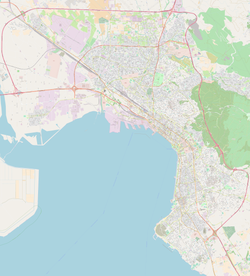Μουσείο Ολοκαυτώματος Ελλάδος | |
 | |
| Location | Thessaloniki, Greece |
|---|---|
| Coordinates | 40°38′38″N 22°55′05″E / 40.644°N 22.918°E |
| Type | Holocaust museum Human rights museum |
| Architect | |
| Website | Official website |
The Holocaust Museum of Greece (Greek: Μουσείο Ολοκαυτώματος Ελλάδος, romanized: Mouseío Olokaftómatos Elládos), officially the Holocaust Memorial Museum & Educational Center of Greece on Human Rights, is a proposed museum on The Holocaust in Thessaloniki, Greece.[1]
YouTube Encyclopedic
-
1/5Views:91314 0397 3513429 837
-
The Jews of Thessaloniki: From antiquity and the Inquisition, to the Holocaust and today
-
Holocaust Survivor Testimonies: Deportation from Greece
-
The Greek Island that Saved a Jewish Family from Nazis
-
The Plight of the Jewish Population in Greece during the Holocaust
-
The Fate of Greek Jewry during the Holocaust
Transcription
Construction and funding
Its construction was proposed in 2016 and is partly funded by Germany (€10 million), the Stavros Niarchos Foundation, with support from the Municipality of Thessaloniki and mayor Yiannis Boutaris.[2][3] The total construction cost is estimated at €25 million ($29.57 million).[2] The foundation stone was placed on 30 January 2018.[4]
In 2022, Albert Bourla, a native of Thessaloniki and CEO of Pfizer, directed his $1 million award from the Genesis Prize for his leadership in delivering the Pfizer–BioNTech COVID-19 vaccine towards the Holocaust Museum of Greece and Holocaust education, with the particular emphasis on the fate of Greek Jewish community.[5][6]
In December 2023, the municipality of Thessaloniki approved the construction of the museum.[7] The project is scheduled to be complete in 2026.
Location
The site chosen for the museum in the city is on an open plaza located at the endpoint of the rail lines and extends the walkway along Thessaloniki’s seashore, connecting the city’s harbor, the historic White Tower and the old railway station, which was used during the war for the deportation of nearly 50,000 Jews.[8]
Background
In 1942 the German forces started implementing the Nuremberg Laws in the city and ordered male Jews to register at Eleftherias Square, where they were publicly tortured and humiliated before being forced into labour.[9][10] A Jewish Ghetto was established near the train station.[11] In 1943 the city's 56,000 Jews were deported, by use of 19 Holocaust trains, to Auschwitz and Bergen-Belsen concentration camps, where 43,000 – 49,000 of them were murdered.[12][13][14] The train journey from Thessaloniki to the concentration camps was the longest of all Holocaust trains,[dubious ] and Jews had to buy a ticket.[15][16]
Between the 15th and early 20th centuries, Thessaloniki was the only city in Europe where Jews were a majority of the population.[2] However, only 2,000 Jews returned after the war and less than 1,000 remain today.[13][14] Overall, 80,000 Greek Jews, or 85% of the total Jewish population, were murdered in the Holocaust.[17]
See also
- History of the Jews in Greece
- History of the Jews in Thessaloniki
- Jewish Museum of Thessaloniki
- List of Holocaust memorials and museums
References
- ^ Karasová, Nikola; Králová, Kateřina (2022). "The Holocaust Museum of Greece, Thessaloniki: In Whose Memory?". Nationalities Papers. 51 (3): 622–643. doi:10.1017/nps.2021.85. ISSN 0090-5992. S2CID 249827508.
- ^ a b c "EXECUTIVE SUMMARY". www.holocausteducenter.gr. Retrieved 2018-09-13.
- ^ "Building permit for Thessaloniki Holocaust Museum finally issued | eKathimerini.com". www.ekathimerini.com. 2023-12-21. Retrieved 2024-01-05.
- ^ "Mουσείο Ολοκαυτώματος, μνημείο στην Ιστορία". Η Εφημερίδα των Συντακτών (in Greek). 2018-01-31. Retrieved 2018-09-13.
- ^ "President of Israel Presents the 2022 'Jewish Nobel Prize' to Pfizer CEO". The Jerusalem Post. 2022-06-29.
- ^ "Albert Bourla, 2022 Genesis Prize Laureate". The Genesis Prize. 2022-01-19.
- ^ Kokkinidis, Tassos (21 December 2023). "Holocaust Museum of Thessaloniki Finally Gets Building Approval". Greek Reporter. Retrieved 5 January 2024.
- ^ "About". The Holocaust Museum of Greece. 2017-01-01.
- ^ University of Athens: Faculty of Political Science and Public Administration (1998). Documents on the history of the Greek Jews: records from the historical archives of the Ministry of Foreign Affairs. Kastaniotis Editions. ISBN 9789600323306.
- ^ Winstone, Martin (2010-06-30). The Holocaust Sites of Europe: An Historical Guide. I.B.Tauris. ISBN 9780857730282.
- ^ Jewish Community of Thessaloniki (2005). "Cultural forum of the Jewish community of Thessaloniki". Ets Ahaim Foundation. Retrieved 2018-09-13.
- ^ Martin Gilbert (1982). The Routledge atlas of the Holocaust. Psychology Press. ISBN 9780415281454. Retrieved 10 August 2011.
- ^ a b Yale Strom (1992). The Expulsion of the Jews: Five Hundred Years of Exodus. SP Books. p. 102. ISBN 9781561710829. Retrieved 13 September 2018.
- ^ a b "Thessaloniki's new Holocaust museum a sign of a city finally embracing its Jewish past". www.timesofisrael.com. The Times of Israel. Retrieved 2018-09-13.
- ^ Richard L. Rubenstein; John K. Roth (2003). Approaches to Auschwitz. Westminster John Knox Press. p. 362. ISBN 9780664223533 – via Google Books, search inside.
- ^ "Jews made pay train fares to Auschwitz". 2015-03-23. Retrieved 2018-09-13.
- ^ Smith, Lyn (2010-09-15). Forgotten Voices of The Holocaust: A new history in the words of the men and women who survived. Random House. ISBN 9781409003595. Retrieved 2018-09-13.




